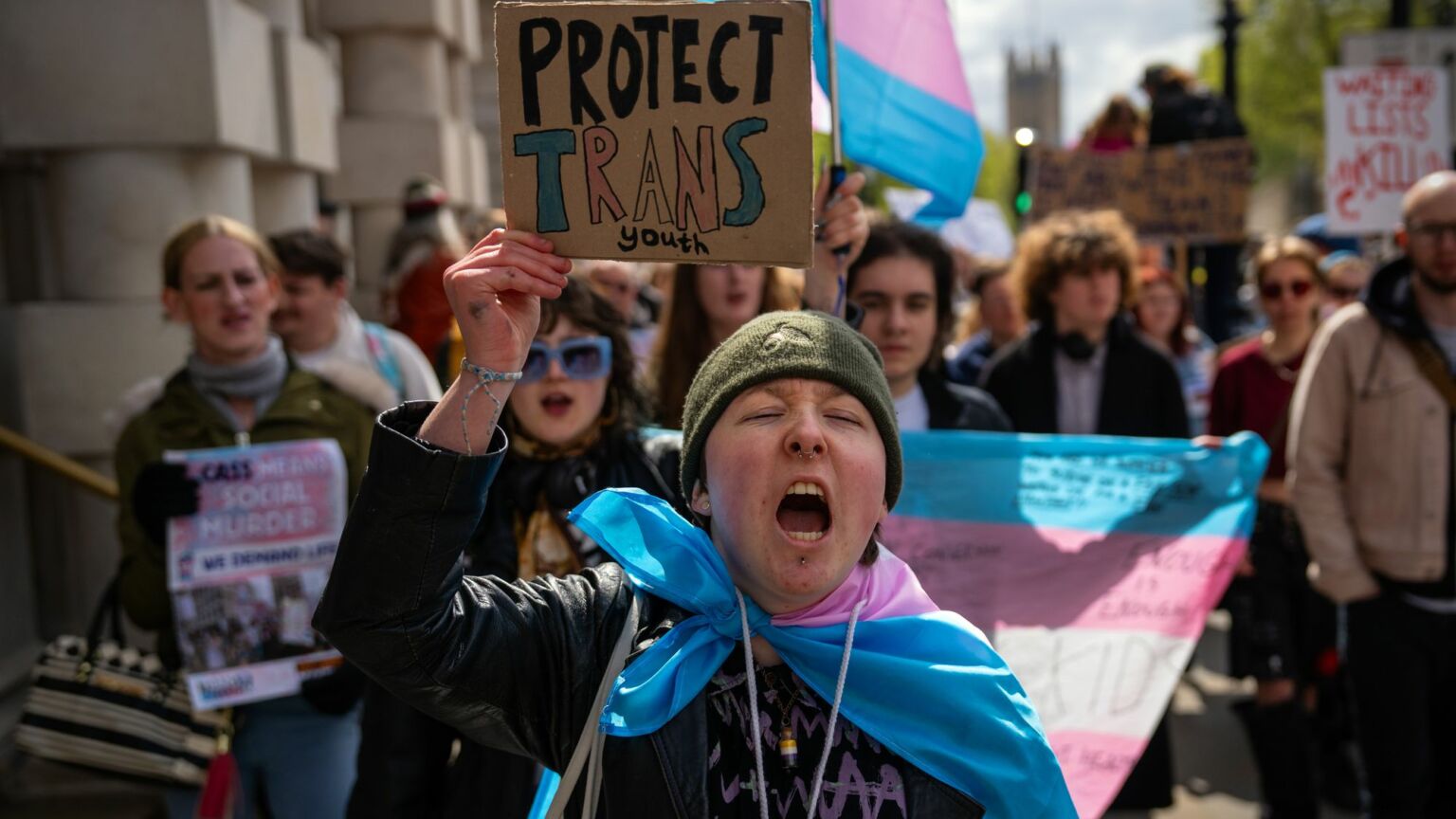Why the NHS puberty-blockers trial is a catastrophic mistake
Suppressing troubled children's puberty compounds their distress and freezes their development.

Want unlimited, ad-free access? Become a spiked supporter.
At the start of this year, it did seem as if sanity had returned to the discussion of children’s mental health after years dominated by trans ideology. The Gender Identity Development Service (GIDS) had been closed down. The NHS had banned puberty blockers. And the claim that trans-identifying people face a dramatically heightened suicide risk without ‘gender-affirming’ treatment had been exposed as a dangerous lie. It certainly looked as though Britain had finally shaken itself awake from the feverish promises of medical transition.
But in February this year, in an astonishing example of snatching defeat from the jaws of victory, the NHS announced that it was to spend £10million on a puberty-blockers trial. It was as if a bridge had collapsed, and had then been cordoned off to prevent further harm, only for engineers to decide to reopen it and send children across it again – as though the precise nature of the disaster could only be clarified by reenacting it.
Last week, it was announced that this puberty-blocker trial – the Pathways Trial – had been granted ‘ethical’ approval. Involving over 220 young participants, aged between 10 and 16, recruited over the next three years. And so it seems that we are back in the same moral swamp that birthed the crisis, medicating vulnerable, troubled children, only this time we cannot pretend we do not know better.
In short, we simply do not need another blocker trial. Previous trials already show what happens when you suppress puberty. You do not ease distress; you freeze the child’s development. Blocking puberty stops the sexual awakening that produces yearning for love, and the turn toward art, music and companionship that normally shape adolescence. Without this process, the brain does not mature and the child remains emotionally and socially childlike.
Once young people have started on puberty blockers, by 18 about 98 per cent persist in a trans identity. They move on to cross-sex hormones, before entering a chemically induced adulthood. Their libido is artificially created – yet without the biological maturation of their reproductive organs they may lack the innate urge to procreate, even while experiencing the chemically driven urge for sex. We do not know, though; we still have no long-term data because the NHS has never followed trial participants into adulthood.
Puberty is not simply the development of secondary sex characteristics. It is the process that carries us into adulthood. Blocking it freezes development at the very stage when most children would naturally outgrow their distress. As a result, the rate at which children desist in their identification with a trans identity, which is roughly 80 per cent, falls to just two per cent. In any other branch of medicine, a two per cent desistance rate – that is, the rate at which young people are abandoning their delusions of being the opposite sex – would be recognised as catastrophic. Yet some clinicians insist that it proves that certain children really are trans.
This woolly thinking has flourished largely since the 2010 drive on the part of the World Professional Association for Transgender Health to depsychopathologise the urge to medically transition. From that point onward, the removal of healthy body parts and the impairment of sexual function has been steadily reframed as an ordinary, even healthy, expression of identity. Questioning any of it is treated as rude or unkind. Apparently the belief that some people should damage their healthy bodies and unsettle their minds for life must be protected at all costs.
In truth, the real unkindness is to let gullible children believe they can become a completely different person. They cannot. Puberty blockers push children on to a pathway that traps them in that impossible fantasy, leaving them stuck trying to become someone they never can be.
It was not long ago that a wish to change one’s sex through surgery or hormones was widely regarded as a mental-health issue. Many children develop conditions such as OCD, anxiety, or phobias. This does not mean a child is really OCD or really phobic, any more than a distressed child is really trans. It means the child, and later the adult, has not yet moved beyond those symptoms. The same applies to gender dysphoria. About 80 per cent of children grow out of it once they go through puberty, the very process the NHS now plans to block. For the minority who continue to struggle, psychosocial support can ease distress. There is no justification for locking a young person into a medical pathway that weakens the body and unsettles the mind.
The UK has already run a puberty-blocker trial and the NHS bears responsibility to the children and families who took part. If even half of the £10million set aside for this new trial were spent on locating and engaging former participants, we could obtain the long-term evidence that matters.
We already know those children did not thrive. Yet we remain in the dark about their adult lives because the NHS has not followed them up. Those young people are now adults. What are their lives like? How is their health? How do they feel about their infertility, their sexual functioning, their relationships? These questions remain unanswered.
Instead, the NHS is preparing to experiment on another 226 children with a follow-up of only two years, ensuring the results will be useless. A short study means inconclusive findings. Inconclusive findings mean calls for a third trial. And on and on it will go while real children bear the consequences.
For anyone imagining that the questionnaires used to decide whether a child will want to be trans for life are thoughtful or clinical, please take a look. They are asinine. The trial’s main outcome will be measured by the ‘Kidscreen 10’ test, which asks children questions such as ‘Have you felt sad?’ and ‘Have you had fun with your friends?’. The gender-identity questionnaire is equally basic, asking children over 12 to choose labels such as cisgender, nonbinary, agender, genderfluid or ‘two spirit’.
The ethical failure here is staggering. Puberty blockers halt the very process that helps most young people grow out of gender distress, The harms of puberty blockers are known. The benefits remain unclear. These children may be distressed, but they are physically healthy.
A year ago, the researcher Carrie Clark set out the ethical concerns for Genspect regarding a puberty-blocker trial, and none has been addressed. Even more astonishing, Genspect was not consulted on the new trial, despite working with hundreds of young adults harmed by early medicalisation. Their stories are bleak. Young men with unwanted breasts and hips. Young women with deep voices, facial hair and mastectomies. Most are same-sex attracted and autistic. Medical transition solved nothing. It created more problems than it resolved.
Yet the NHS behaves as if clinicians can somehow predict which children should transition. How could they possibly know this?
Countries across the world are pulling back from medicalised gender pathways. The evidence now demands caution. Yet in the UK, after Keira Bell, after Cass, after everything we have learned, the NHS has chosen to repeat the same mistake again.
Please sign this memorandum of understanding to protect the role of puberty in adolescence.
Stella O’Malley is the director and founder of Genspect.
You’ve hit your monthly free article limit.
Support spiked and get unlimited access.
Support spiked and get unlimited access
spiked is funded by readers like you. Only 0.1% of regular readers currently support us. If just 1% did, we could grow our team and step up the fight for free speech and democracy.
Become a spiked supporter and enjoy unlimited, ad-free access, bonus content and exclusive events – while helping to keep independent journalism alive.
Monthly support makes the biggest difference. Thank you.










Comments
Want to join the conversation?
Only spiked supporters and patrons, who donate regularly to us, can comment on our articles.